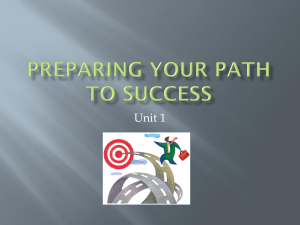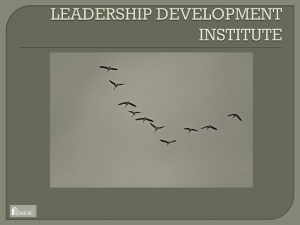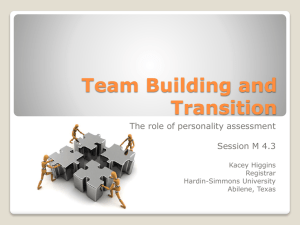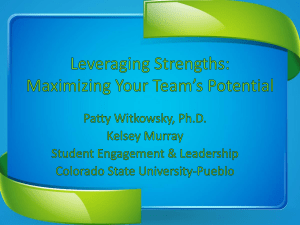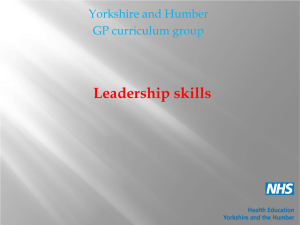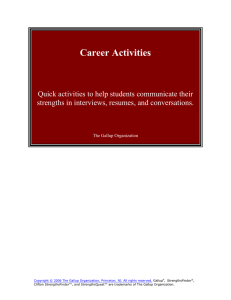PLAY - Jim Casey Youth Opportunities Initiative
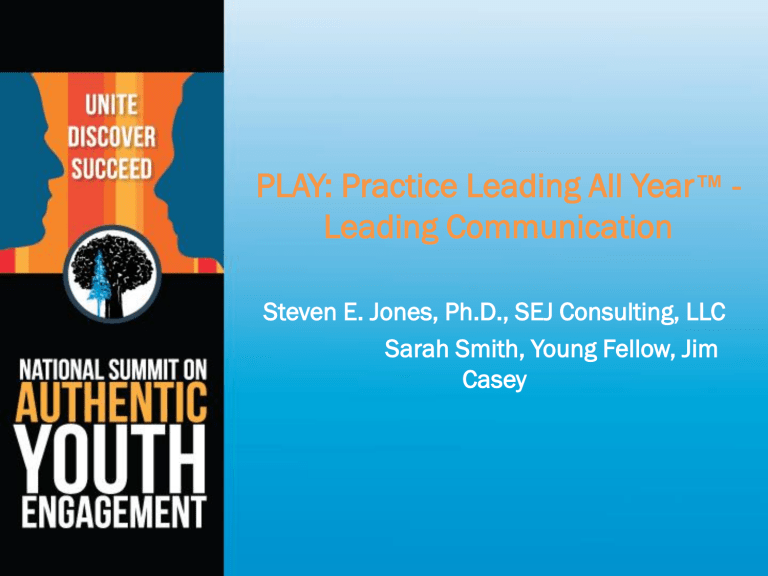
PLAY: Practice Leading All Year ™ -
Leading Communication
Steven E. Jones, Ph.D., SEJ Consulting, LLC
Sarah Smith, Young Fellow, Jim
Casey
Play … Objectives
By the end of the session the participants will
• Connect the use of self-assessment and selfknowledge as key aspects of leadership development.
• Experience coaching and somatic movement for creating a leadership body and framing leadership presence.
• Participants will practice key communication strategies for making requests.
P.L.A.Y.
™ …
PLAY
™
…
PRACTICE
LEADING
ALL
YEAR
Tools to Learn About Ourselves & Others
MBTI
Using type to learn about our differences and our similarities in…
Where we gain energy
How we take in information
How we make decisions
How we live in the world
4
Why Use MBTI?
To understand oneself
To understand others
An indicator of our preferences
Not to classify or limit people
Well researched and backed by theory
Internationally used and accepted.
5
Remember
MBTI is…
A description of
preferences, not abilities, maturity or development
A way to use preferences to explore our differences and to help improve methods of communication
MBTI is not…
An excuse
An explanation of everything
A name or label
6
Ways of Gaining
Energy
Ways of Taking in
Information
Ways of Making
Decisions
Ways of Living in the World
E
Extrovert
Focuses on the outside world and gets energy through interacting with other people and things.
S
Sensor
Uses the five senses; notices and trusts facts, details and the present reality .
T
Thinker
Makes decisions using logical, objective analysis.
J
Judger
Is organized and makes decisions quickly.
I
Introvert
Focuses on the inner world and gets energy through reflecting on information, ideas and concepts .
N
Intuitive
Uses the “ sixth ” sense and attends to and trusts interrelationships, theories and future possibilities .
F
Feeler
Makes decisions that create harmony by applying person-centered values .
P
Perceiver
Is flexible and adaptable and keeps options open as long as possible .
Tools to Learn About Ourselves & Others
StrengthsFinders
StrengthsFinder is a tool to seek out your dominant strengths and a program to focus on capitalizing on these strengths.
Three books:
• StrengthsFinder 2.0
• Now, Discover Your Strengths
• Go Put Your Strengths to Work
8
Time to Be Clear…
• StrengthsFinder gives you themes… not strengths; help you discern strengths
• Strengths are the things you do consistently & near perfectly
• Strengths have three ingredients:
Talents, skills & knowledge
Signs of a Strength
S
uccess
I
nstinct
G
rowth
N
eeds
Signs of a Weakness
Lack of…
S
uccess
I
nstinct
G
rowth
N
eeds
StrengthsFinder
• Sarah’s Strengths
– Empathy
– Restorative
– Input
– Intellection
– Developer
“Leading from where we stand.”
“ LEADERSHIP IS THE ACT OR PROCESS OF
INFLUENCING THE ACTIVITIES OF AN ORGANIZED
GROUP IN ITS EFFORTS TOWARD GOAL SETTING AND
GOAL ACHIEVEMENT.
”
– R.M. STOGDILL, HANDBOOK OF LEADERSHIP:
INFLUENCE
“ T HE POWER OR CAPACITY OF CAUSING AN EFFECT IN
INDIRECT OR INTANGIBLE WAYS ”
– F ROM W EBSTER ’ S D ICTIONARY
Speech Acts
Language is not only descriptive but fundamentally creative and generative. Language is, therefore, action.
Assessments and Assertions
Declarations
Requests, Offers, and Agreements
Source: Brothers, 2005
Enrollment
Getting a person, group, organization on board with you is the pursuit of an outcome or activity.
The goal of enrollment conversations: to leave the person or parties Touched, Moved or Inspired.
What Makes An Effective
Communicator
Talking to Connect
P.L.A.Y
.™:
Archetypes for Powerful Presence
Monarch
Warrior Center
Fool
Lover
Center
A place of groundedness
Center is our foundation.
Center is the key to harnessing the power from each of the archetypes.
WARRIOR
Warrior energy is the energy we use to bust through the barriers in front of us like a hot knife through butter. It is the energy of the Samurai, or that of a mother fighting for her child or project manager moving his or her team forward despite the breakdowns of life.
WARRIOR
Practice
• Get clear about what you are committed to that is larger than yourself. Stay clear about it. Remind yourself daily.
Getting and staying clear is a practice, one you
might choose to live.
• Practice the Shogun strike daily for the sake of what you are committed to larger than you. Do 10 strikes a day for each one
MONARCH
King/Queen energy is the energy we use to remain calm in the face of a storm. We are relaxed and sensing all yet we do not tighten or tense up to produce the illusion of being calm, we ARE calm. We are in our feet and our feet are on the ground. We are a rock. From this place others may find calmness too.
King/Queen
Practice
• Go out into public and stand in the posture of the King/Queen.
• Insert yourself (physically) into situations at home or work where there is discord, or an argument and practice staying centered and aware as often as possible.
• As much as possible, stay in any conversation that is uncomfortable while repeating the mantra in your head “everything is going to be
OK ”
Hint: You are in this energy if you are able to be centered, relaxed, seeing all and connected to all while all hell breaks loose around you.
Designing your conversation
What do you want out of it?
What do you know about your audience?
What will you have to do to build connection?
Scripting
• Context
• Effective Questions
• Listen for
Using Yourself
Making Requests
Effective Requests include:
What you want.
Who you want it from.
Conditions of satisfaction:
Timeframe.
Outcome you are expecting.
A shared context.
Complete with a
response (yes, no, counteroffer).
Agreements
(Promises, Commitments)
Occurs when a request or offer is met with a “ yes.
”
We can actively “ manage our commitments.
”
Communities are collections of agreements — this is how we coordinate action.
Affects our relationships and trust if we break or have missing agreements.
30
Getting to Agreement
Possible Replies to Requests
Yes = Agreement
No
Renegotiate = Counteroffer
Commit to commit
Making Effective and Complete Requests
Be precise with your language. Ask for what you really want.
Ask yourself, “ What do I want to happen or stop happening as a result of what I’m about to say?
”
Speak in a manner that fits your style and relationship.
Check for understanding.
Listen carefully to the response – did you receive a committed response?
Use gracious persistence in follow-up to a non-response.
Remember, when you request, you’ re joining words and action.
Practice Plan
Skill
1.
What I Might Practice What I Will Practice When
2.
3.
PLAY
™
…
PRACTICE
LEADING
ALL
YEAR
™
PLAY …
BE THE CHANGE YOU WANT TO
SEE IN THIS WORLD.
- Gandhi
